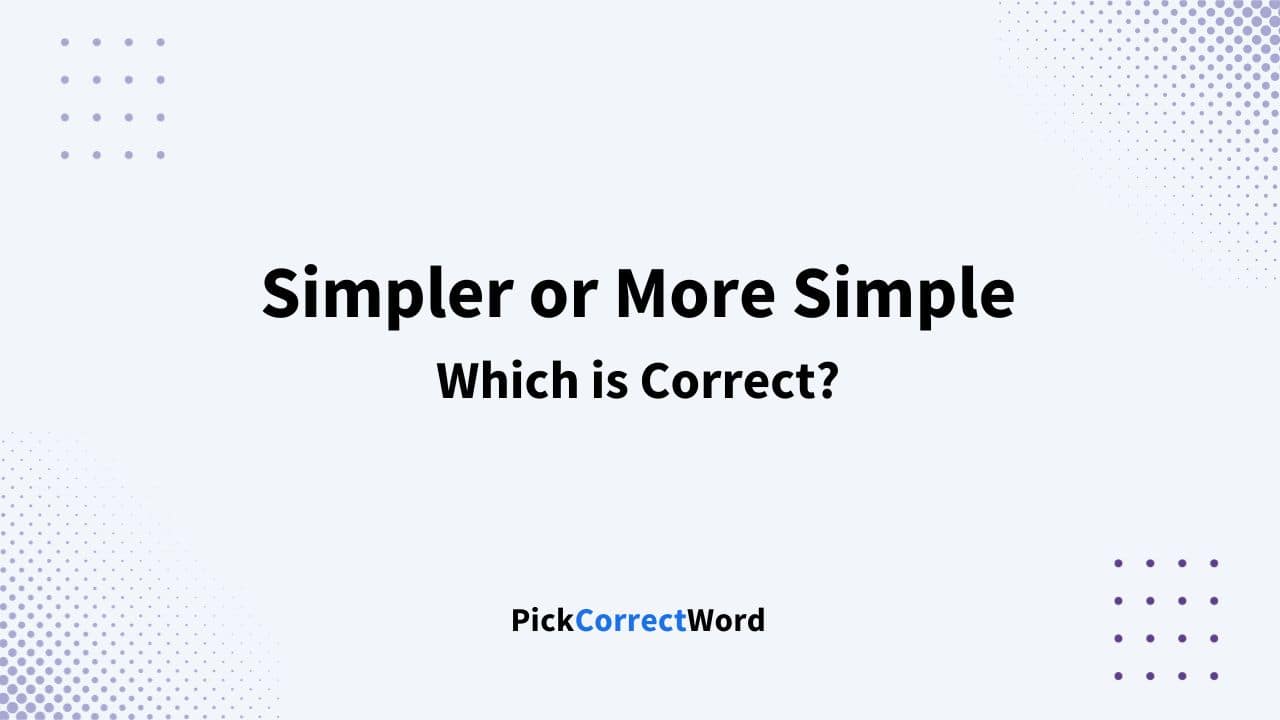When you’re comparing things, you might question whether it’s correct to say something is simpler or more simple. Both phrases sound right when you speak.
Simpler is actually the correct word. You should use it when talking about something that’s not complex or things that are easier to grasp compared to others.
Simpler or More Simple? Which is Correct?
The correct form to use is “simpler” when comparing two things.
This follows a basic English grammar rule. The rule is that adjectives with one or two syllables get an “-er” at the end to form their comparatives.
“More simple,” on the other hand, is grammatically incorrect. When using the comparative form of “simple,” you should only use “simpler,” without the word “more.”
Here is an example:
- This puzzle is simpler than the one we did yesterday.
Grammatical Rules for ‘Simpler’ and ‘More Simple’
The rule is that you use “simpler” as the comparative form of “simple” rather than “more simple.” As mentioned above, the logic here is that “simple” is a short, two-syllable adjective, so it takes “-er” at the end to show a comparison.
Adjectives like “simple” that have two syllables or fewer typically take an “-er” suffix to become comparative.
For example:
- “Fast” becomes “faster”
- “Happy” becomes “happier”
- “Thirsty” becomes “thirstier”
- “Heavy” becomes “heavier”
‘Simpler’: When To Use
When you’re comparing two things and need to express that one is less complex than the other, use the word ‘simpler.’
Remember these points:
- One or Two Syllables: If the adjective has one or two syllables, add ‘-er’ to create the comparative form. ‘Simple’ has two syllables, so it becomes ‘simpler.’
- No Additional Words: Instead of adding extra words like ‘more’ to construct the comparison, the ‘-er’ suffix keeps your sentence concise.
Examples:
“This puzzle is simpler than that one.”
“Your instructions were simpler than the manual’s.”
‘More Simple’: When To Use
In pure grammatical terms, “more simple” is considered incorrect usage.
However, you might come across situations where using ‘more simple’ seems to be the better choice. In these rare and very specific instances, ‘more simple’ might be used for emphasis, particularly in spoken English.
For example, when you want to stress the difference in simplicity between two objects or concepts distinctly, you could say:
“This is more simple than I thought!”
This usage, conversely, is not grammatically traditional and should generally be avoided in formal writing.
Remember these points for clarity:
- ‘Simpler’ is the usual form for the comparative degree of the adjective ‘simple.’
- ‘More simple’ can be occasionally used in conversational contexts for emphasis but remains nonstandard.
The following table should simplify this for you:
| Singular Subject | He/She/It sounds good. |
| Plural Subject | They sound good. |
| Imperative | Sound good? |
Alternative Phrases for ‘Simpler’
When you want to say something is not complicated, you might look for other words or phrases that mean ‘easy’ or ‘not complex’. Here are a few options you can try instead of ‘simpler’:
- Less complicated: This phrase puts emphasis on the reduction of complexity.
- More straightforward: This suggests that something is more direct or easier to understand.
- Easier: A very common alternative, ‘easier’ implies something requires less effort or difficulty.
Depending on the situation, you might pick different words. For example, if you’re comparing tasks, ‘easier’ or ‘less complicated’ could work better. If you’re talking about a process, ‘more straightforward’ might be a good fit. It’s important to choose the right word for your situation to make sure your message is clear. When writing, pick the word that goes best with the rest of your content.
examples of using ‘simpler’ in a sentence:
“I want you to make your writing simpler to ensure it’s easily understood.“
“Nothing is simpler than a cool white shirt.“
“The instructions provided by the teacher made the concept simpler for the students to understand.“
“The test was simpler than expected.“
“Life is so much simpler when you stop explaining yourself to people and just do what works for you.“
“Always choose the simpler path to avoid confusion.“


